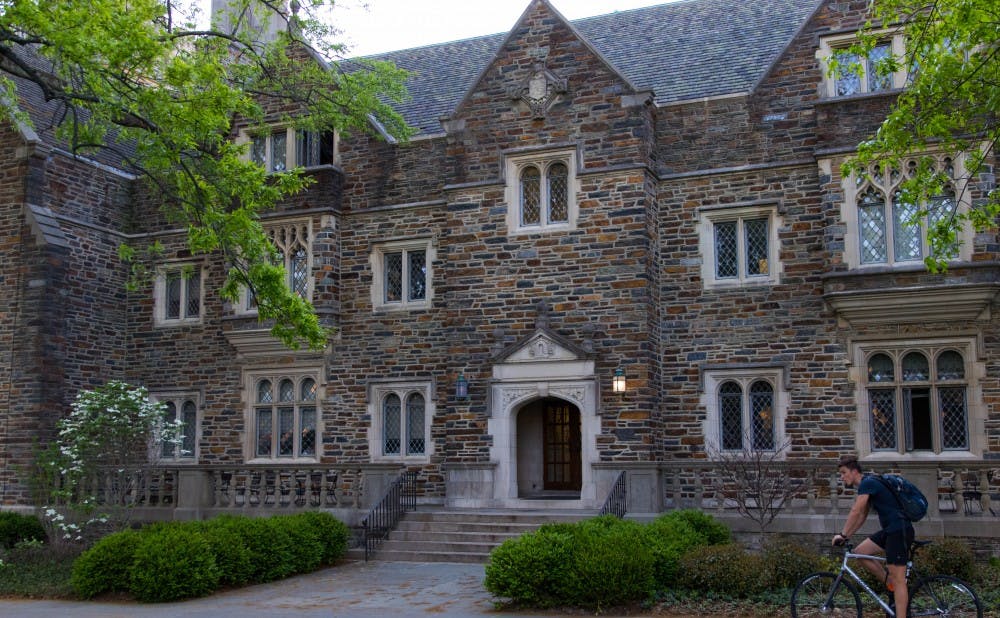Academic Council unanimously voted to approve the Duke-Margolis Center for Health Policy’s request to transition to University institute status and heard a proposal for a new executive master of public affairs degree program from the Sanford School of Public Policy at its Thursday meeting.
Approval of Duke-Margolis Center as a University institute
The Council unanimously approved the Duke-Margolis Center for Health Policy’s request to become a University institute. The proposal will now go to the Board of Trustees for further approval.
The primary reason for this request, according to Mark McClellan, director of the Duke-Margolis Center, was to “elevate [its] standing to be equal to peer institutions across the country,” which he also believes will help with faculty recruitment to the program.
The Council’s approval of this request signals that it believes that the Duke-Margolis Center has met the seven criteria required of University institutes, among which are a substantial educational footprint, strategic significance for the University and the identification of opportunities for external fundraising.
Before approving the Center’s request, the Council read responses to lingering questions from council members, the first of which was related to faculty appointments within Margolis.
“Our primary recruitment of faculty members and top recruitment priority will continue to be through joint recruitments of tenure track faculty with our partner schools and departments (with those units serving as the primary appointment),” Margolis faculty wrote.
The Center’s transition to an institute would not automatically allow it to hire regular-rank faculty members with primary appointments within the institute. Instead, it would allow the institute to request this authority from the Council should it be deemed necessary in the future.
The second question addressed the relationship between Margolis and Sanford. The response from Margolis faculty emphasized that while “Margolis has had a strong and synergistic relationship with Sanford since its inception,” it will continue to stand as “a university-wide, interdisciplinary unit that [reports] both to the Provost and the Chancellor of the Health System” instead of being contained within a particular Duke school.
“Health policy will continue to be an area of concentration within Sanford,” and the two university institutions will continue to work together on projects such as the Undergraduate Health Policy Certificate Program and “joint health policy faculty hires.”
New executive master of public affairs degree
The Sanford School of Public Policy presented a proposal to Academic Council for a new executive master of public affairs degree program, which would target mid-career public service professionals with 7 to 10 years of working experience and operate using a hybrid teaching model. The Council will vote on the proposal during their next meeting on Nov. 30.
Asher Hildebrand, associate professor of the practice in the Sanford School of Public Policy, Judith Kelley, dean of the Sanford School, and Mark Hart, director of digital learning at the Sanford School, presented the proposal.
According to Hildebrand, there are five key pieces of rationale for the creation of the new degree program: advancing Sanford’s core mission by training an “important population of public servants not reached by [Sanford’s] current programs,” enhancing Sanford’s competitiveness and relevance, generating new revenue for the school, deepening and complementing Sanford’s existing strengths and broadening Sanford’s community and network of students and alumni.
The presentation included a chart comparing Duke to other top-10 ranked policy analysis programs.
“Duke is the only program on this list, the only school on this list that offers neither a mid-career generalist program nor an online or hybrid version of its flagship master's program,” Hildebrand said, identifying it as an area where Duke can “catch up” to peers.
The program would start with a cohort of 25 students, who would all be mid-career working professionals. Students would be able to complete the degree in either 15 months as full-time students or in 18 months as part-time students.
The full-time program would include two summer semesters, a fall semester and a spring semester, while the part-time program would include an additional fall semester. Upon program review, the initial cohorts would expand to stable cohort sizes of 50 students.
The curriculum for the program would include four core courses, three electives and three courses in leadership, management and ethics. Hildebrand emphasized that the program is designed to operate using a “purpose-built hybrid modality” that will combine “intensive in-person residencies and both synchronous and asynchronous online learning reflecting the latest pedagogical advances.”
Students would participate in on-campus intensives during the first summer, fall and spring sessions and would attend an intensive at Duke in DC during their second summer. Hildebrand, Kelley and Hart emphasized that they want students in the program to experience the “benefits of cohort development from being in-person while also providing students the flexibility to otherwise be wherever they're working.”
The proposed initial tuition rate for the program would be $60,000, with a proposed 25% financial aid allocation.
In other business
In response to an anonymous question from a member of the Council, representatives from the offices of the provost and the president and faculty members discussed the “pass the harasser” phenomenon in higher education, including Duke’s policies surrounding faculty hiring, personal records and investigations into faculty members.
At the end of the meeting, the Council transitioned into private executive sessions to discuss faculty’s questions regarding DKU and to consider an update to Appendix L of the Faculty Handbook concerning the University’s policy on consensual romantic or sexual relationships between faculty and students.
Get The Chronicle straight to your inbox
Signup for our weekly newsletter. Cancel at any time.

Holly Keegan is a Trinity sophomore and a university news editor of The Chronicle's 119th volume.

